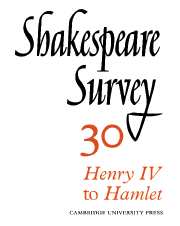Book contents
- Frontmatter
- ‘Henry IV’ and ‘Hamlet’
- Prince Hal and Tragic Style
- The True Prince and the False Thief: Prince Hal and the Shift of Identity
- Falstaff, the Prince, and the Pattern of ‘2 Henry IV’
- Whatever Happened to Prince Hal?: An Essay on ‘Henry V’
- ‘Henry V’ and the Bees’ Commonwealth
- ‘All’s Well that Ends Well’
- ‘Hamlet’ and the Power of Words
- Hamlet the Bonesetter
- ‘Hamlet’: A Time to Die
- Shakespeare, Lyly and Ovid: The Influence of ‘Gallathea’ on ‘A Midsummer Night’s Dream’
- Making a Scene: Language and Gesture in ‘Coriolanus’
- Freedom and Loss in ‘The Tempest’
- Inigo Jones at The Cockpit
- Theory and Practice: Stratford 1976
- The Year's Contributions to Shakespearian Study 1 Critical Studies
- 2 Shakespeare’s Life, Times, and Stage
- 3 Textual Studies
- Index
- Plate Section
‘Henry V’ and the Bees’ Commonwealth
Published online by Cambridge University Press: 28 March 2007
- Frontmatter
- ‘Henry IV’ and ‘Hamlet’
- Prince Hal and Tragic Style
- The True Prince and the False Thief: Prince Hal and the Shift of Identity
- Falstaff, the Prince, and the Pattern of ‘2 Henry IV’
- Whatever Happened to Prince Hal?: An Essay on ‘Henry V’
- ‘Henry V’ and the Bees’ Commonwealth
- ‘All’s Well that Ends Well’
- ‘Hamlet’ and the Power of Words
- Hamlet the Bonesetter
- ‘Hamlet’: A Time to Die
- Shakespeare, Lyly and Ovid: The Influence of ‘Gallathea’ on ‘A Midsummer Night’s Dream’
- Making a Scene: Language and Gesture in ‘Coriolanus’
- Freedom and Loss in ‘The Tempest’
- Inigo Jones at The Cockpit
- Theory and Practice: Stratford 1976
- The Year's Contributions to Shakespearian Study 1 Critical Studies
- 2 Shakespeare’s Life, Times, and Stage
- 3 Textual Studies
- Index
- Plate Section
Summary
Henry V, whatever one's view of its king as hero or prig, owes a debt to the mirror for princes tradition of Augustine, Erasmus and Sackville in one way or another. The Chorus to act II, in calling Henry 'the mirror of all Christian kings', conflates Erasmus's Institutio principis Christiani with the Mirror for Magistrates. The list of instances in which Henry's conduct fits the requirements of Erasmus's prince is a long one. Consequently it is the more striking when we find Shakespeare using an incident which occurs in Erasmus but in a way which differs radically from his version. The incident which Shakespeare altered in what I take to be a significant way is the fable of the bees, which Henry's Archbishop offers to him in a lengthy speech as a pattern for the organisation of his commonwealth in time of war (i, ii, 187-204).
The first known use of the parallel between human society and the beehive was in Virgil's Georgics IV, where of course it was readily available to Shakespeare. Its first use as a lesson for a young prince was by Seneca in his De Clementia, written for his pupil Nero. Thomas Elyot also used it for the young Edward VI, and it appears in a similar context in Erasmus's Institutio.
- Type
- Chapter
- Information
- Shakespeare Survey , pp. 61 - 72Publisher: Cambridge University PressPrint publication year: 1977
- 2
- Cited by



